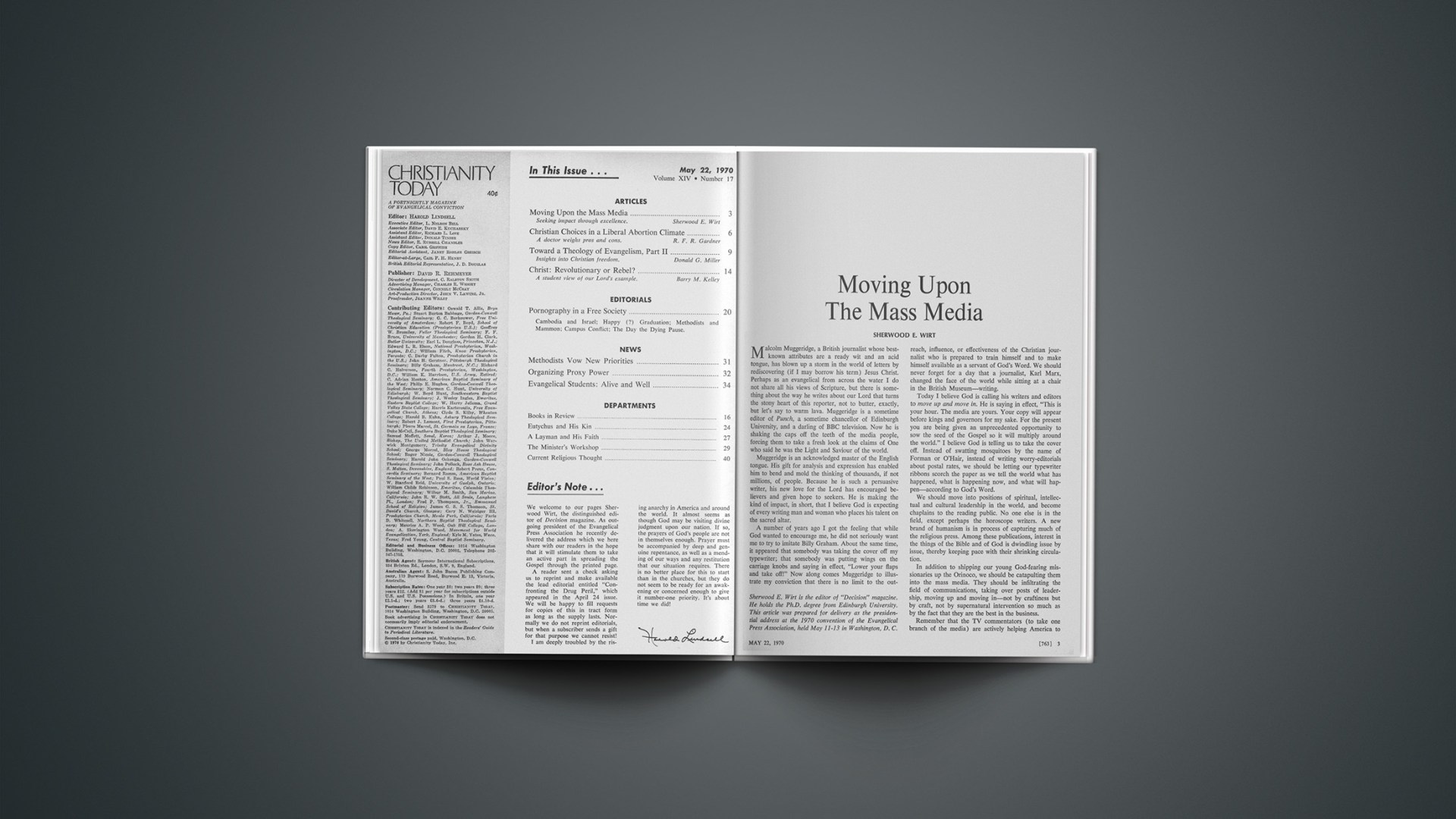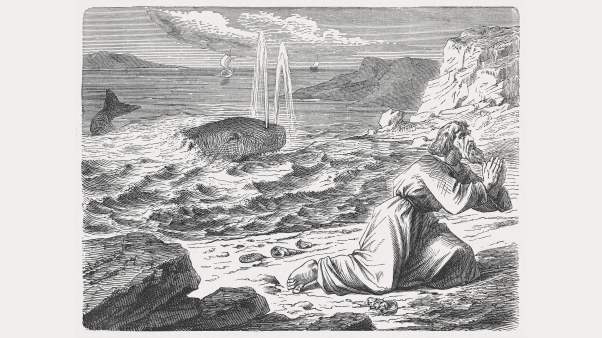Malcolm Muggeridge, a British journalist whose best-known attributes are a ready wit and an acid tongue, has blown up a storm in the world of letters by rediscovering (if I may borrow his term) Jesus Christ. Perhaps as an evangelical from across the water I do not share all his views of Scripture, but there is something about the way he writes about our Lord that turns the stony heart of this reporter, not to butter, exactly, but let’s say to warm lava. Muggeridge is a sometime editor of Punch, a sometime chancellor of Edinburgh University, and a darling of BBC television. Now he is shaking the caps off the teeth of the media people, forcing them to take a fresh look at the claims of One who said he was the Light and Saviour of the world.
Muggeridge is an acknowledged master of the English tongue. His gift for analysis and expression has enabled him to bend and mold the thinking of thousands, if not millions, of people. Because he is such a persuasive writer, his new love for the Lord has encouraged believers and given hope to seekers. He is making the kind of impact, in short, that I believe God is expecting of every writing man and woman who places his talent on the sacred altar.
A number of years ago I got the feeling that while God wanted to encourage me, he did not seriously want me to try to imitate Billy Graham. About the same time, it appeared that somebody was taking the cover off my typewriter; that somebody was putting wings on the carriage knobs and saying in effect, “Lower your flaps and take off!” Now along comes Muggeridge to illustrate my conviction that there is no limit to the outreach, influence, or effectiveness of the Christian journalist who is prepared to train himself and to make himself available as a servant of God’s Word. We should never forget for a day that a journalist, Karl Marx, changed the face of the world while sitting at a chair in the British Museum—writing.
Today I believe God is calling his writers and editors to move up and move in. He is saying in effect, “This is your hour. The media are yours. Your copy will appear before kings and governors for my sake. For the present you are being given an unprecedented opportunity to sow the seed of the Gospel so it will multiply around the world.” I believe God is telling us to take the cover off. Instead of swatting mosquitoes by the name of Forman or O’Hair, instead of writing worry-editorials about postal rates, we should be letting our typewriter ribbons scorch the paper as we tell the world what has happened, what is happening now, and what will happen—according to God’s Word.
We should move into positions of spiritual, intellectual and cultural leadership in the world, and become chaplains to the reading public. No one else is in the field, except perhaps the horoscope writers. A new brand of humanism is in process of capturing much of the religious press. Among these publications, interest in the things of the Bible and of God is dwindling issue by issue, thereby keeping pace with their shrinking circulation.
In addition to shipping our young God-fearing missionaries up the Orinoco, we should be catapulting them into the mass media. They should be infiltrating the field of communications, taking over posts of leadership, moving up and moving in—not by craftiness but by craft, not by supernatural intervention so much as by the fact that they are the best in the business.
Remember that the TV commentators (to take one branch of the media) are actively helping America to make up its mind. These journalists have become the national interpreters of our day. Television has not yet developed its own experts, its own schools of communication, its own training programs. It is still leaning on individual journalists who can discern the signs of the times. They are being sought out and presented to millions of viewers. In the increasing chaos of our exploding society, think of the need for wisdom, for profundity, for depth of analysis. Think of the need for a Christian understanding of men and events, for a biblical point of view that nails sin for what it is and points to a solution that draws on all the resources of the universe.
Is all this too much to expect? Is there anywhere in the journalistic field an evangelical capable of such an assignment? I say there are a lot of people who are capable of being capable of such a role. There are a lot of mute Muggeridges around who could do a better job than our English friend is doing, if they had the opportunity—and the preparation.
Two types of men exemplify the goals we seek. The first is the Renaissance Man. In seeking to envision the person whom the media of the seventies most admire and seek to emulate, I keep coming back to the Renaissance Man. He is the man not of encyclopedic knowledge so much as encyclopedic interest. He is the connoisseur, even the dilettante. He is the William Buckley type who seems comfortably at home in any field of human inquiry, the George Plimpton type who is game for anything. He is the man of wide-ranging interest, of polish, of sophistication, of manners, of taste, of humor. He makes strong points in a gentle, telling manner. He is civilized; he does not “lose his cool.” He knows his history, his languages, his poets, his scientists, his sports. He is one of the beautiful people, cultured, cultivated, educated, charming.
A contrast is the Reformation Man. This man originated in the same period of history, but he is different. The Reformation Man is a man of God’s book. He is a man of unrelenting purpose and moral passion, a man with the gleam of eternity in his eye. He is a buttonholer for Christ. He is looking for revival in the Church. His aim is not to go forward so much as to go back—back to the first century, back to the time when God revealed himself in the spoken Word. The Reformation Man is not a man of pleasantries but a man of action. He is God’s prophet. He proclaims the Gospel of Jesus Christ, the glad tidings of great joy. He also pierces men’s consciences, warns men of hell and judgment, and bids them repent and be saved. To him the mass media are tools provided by God, to be used while there is time before the end, by the Holy Spirit, to draw men into the Kingdom.
Both these streams entered our civilization about the same time, in the fifteenth and sixteenth centuries; and as historians have pointed out, our modern society has witnessed almost the complete triumph of the Renaissance over the Reformation. My feeling is that Christian journalists of the seventies should seek to combine the Renaissance Man and the Reformation Man. We cannot do without the one or the other. The Renaissance Man today identifies with his hearers but has nothing to proclaim to them; the Reformation Man has the proclamation but so often cannot identify with the people he wants to reach.
As an illustration of this combination, consider the Apostle Paul. As Renaissance Man he quoted the Greek poets Epimenides and Menander; as Reformation Man he quoted Isaiah and Moses and David. Paul told the people of Philippi, “I am become all things to all men, so that by all means I might save some.” That is the Renaissance Man speaking. But to the people of Corinth he said, “I determined to know nothing among you save Jesus Christ and him crucified.” That is the Reformation Man speaking.
A less successful but instructive example of the combined Renaissance and Reformation Man was the Swiss Reformer Ulrich Zwingli, a contemporary of Luther. Although a priest, this man was a genuine humanist and a friend of Erasmus. He became a Christian and a Reformer by reading the newly edited Greek New Testament. Zwingli was a good thinker and writer, a natural leader, and the most attractive of all the Reformation figures. Because of his command of Scripture he became the most important man in the canton of Zürich and was able to break the papal yoke.
But Zwingli hurt his witness at three significant points. (1) His Renaissance sex pattern got him into trouble. (2) His Reformation zeal caused him to go along with the persecution of the Anabaptists. (3) He fell into the trap of Christian activism, the same trap that is now ensnaring such theologians as Richard Shaull and Harvey Cox. I mean the activism that takes a man from his first love, puts him on a white horse, and convinces him that he is the saviour of the people. Zwingli moved from evangelistic activity to social activity to political activity to military activity, and ended his life on the battlefield.
Why do we need to be Renaissance Men? Because we have fallen into a cultural and spiritual morass in the Western world. One does not need to read Mailer or Nabokov or Jacqueline Susann to discover that. In journalism the gap that is yawning between the American news media and the “silent majority” is more than a disparity between leftist intellectualism and middle-class conservatism. We are just not being well informed. Many of the journalists, editors, newscasters, and commentators who serve us are cultural nincompoops. They seem to have very little sense of history. They don’t know their Toynbee; apparently they are ignorant of the classics. They never quote the Bible. They are evidently monolinguists; there is seldom a reference to any other culture. If they travel, it seems to be from one Hilton bar to another. When they are required to take an editorial stand, there appears to be no point of reference, so they mount their chargers and ride off in all directions.
I say the Christian journalist should be a Renaissance Man who knows more about culture and history and custom than the skeptical reporter alongside him. He should know more about this world even though he doesn’t belong to this world and is looking for a better world. He should know, for example, that what has made the American system of government work, and a hundred others fail, is the arrangement of checks and balances in the Constitution—a system based on the doctrine of original sin, as James Madison learned it at the feet of the Reverend John Witherspoon at the College of New Jersey.
He should also know the English language and the writers who have mastered it. Journalism courses are no substitute for a grasp of Geoffrey Chaucer, William Shakespeare, John Milton, John Bunyan, Jonathan Swift, Samuel Johnson, Robert Browning, Ernest Hemingway. It isn’t enough to know Augustine and Kierkegaard; we must also be familiar with Dostoevsky and Marx.
Now let us look at the Reformation Man, God’s man in today’s world. More than anything else, the communications industry needs Christian journalists who are committed to what Dr. John Mackay calls the “majesty of truth.” These men should be moving up and moving in, to direct not only religious publications but secular publications as well. Their concept of truth would be formed by him who said, “I am the truth.” Their function would be not only to sort out fact from opinion but to distinguish fact from rumor, fact from gossip, fact from character assassinaton. They would be committed to the proposition that truth exists, and that truth is in order to goodness. Popular Marxist doctrine today holds that eternal truth does not exist, that what is true at one point in the history of the party may not be true at another point. Accordingly, man’s inhumanity to man is not always “wrong.” Pilate’s philosophy belongs in that category. So does Machiavelli’s. So does Xuan Thuy’s, and that is the real dialogue problem at the bargaining table in Paris.
The Christian Church stands or falls on its belief that the Bible is truth. Scripture does not interest the Church because of certain antiquarian or archaeological or anthropological or cosmological or literary aspects that appeal to the modern researcher. It interests the Church for one reason only: because God said it was truth. God said that the Old and New Testaments composed his Word; and since he is the author of truth, that makes the Bible true.
But what does the Bible say that is true? It says that man is a sinner and that God can save him for eternity in Jesus Christ. Whether man’s sin is transmitted from generation to generation by the genes or the chromosomes or some other medium is not important. The point is that, according to the Bible, man sins. All men sin. The fact that man also does good deeds does not help him spiritually. An engine that is half good and half bad won’t run. A news report that is slanted can’t be trusted. The only way to fix the engine is to overhaul it, and the only way to correct the slanted newscast is to stand it alongside the truth.
The Reformation Man in journalism should be the most accurate and dependable person in the business. It was said of the great baseball pitcher Christy Mathew-son that if he was in a game and the umpires had a close decision to make, they would ask his opinion even though he was a competitor, because he had such a reputation for honesty. That should be the Reformation Man—eager to find the facts, determined to be fair, quick to acknowledge his mistakes, zealous of the truth.
The Reformation journalist should not take advantage of his responsible position to preach doctrine where he is not invited to preach, but that does not mean that he cannot defend the Bible, that he cannot express Christian convictions about the great issues of our day, that he cannot help mankind as well as inform, that he cannot in some basic way try to lift the burdens of the people by pointing to the source of relief. God help him if he doesn’t! I would expect the Reformation Man in every story he writes to assume that right is better than wrong, faith is better than doubt, courage is better than fear, joy is better than grief, and love is better than hate. I would expect him to circulate encouraging news wherever he finds it, and to avoid sensational and inflammatory treatment of news that is not in the public interest.
In our religious publications, I would say that as Reformation Men a prime urgent need is to go back to the Bible and start preaching salvation by grace. The “four spiritual laws” are excellent food for babes; but many of the people who read our publications need strong meat, and we keep on with the pablum. Many of the liberal religious publications in our country are in trouble because they have stopped being themselves. They are no longer interpreting life spiritually but have become like everybody else. When people pick up a religious paper, they expect it to say something about God. They expect it to approach the problems of life from a spiritual standpoint. They expect to find its writers standing on the bridge for God and truth and righteousness, even though the decks are awash and the ship is sinking. Many of these readers are unconsciously looking for help. When they find religious papers reflecting what they read everywhere else, they lay them down.
Salvation! The cross! The new birth! The empty tomb! Forgiveness of sin! The baptism of the Spirit! Justification by faith! Sanctifying power! The priesthood of believers! Freedom in Christ! These were the great Reformation themes; these should be our themes as writers for Christian publications. They are as valid on Mars as on Earth, and they will last forever.
When I say that we should combine in ourselves the Renaissance Man and the Reformation Man, I mean to make some exceptions. We hardly rate as “beautiful people,” and I’m not sure we ought to. The paragon of all Renaissance Men was Erasmus, and he was probably the most confused man of the sixteenth century. The Renaissance started out as the rebirth of Greek culture, and Greece is a tragic example of what happens to a civilization that has no clear spiritual moorings. We can do without the morals of the Renaissance.
In the same way we cannot swallow the Reformation whole. Michael Servetus died by the sanction of John Calvin because he took a theological position that Calvin considered unorthodox. Those who deny their fellow men the right to be human beings have no business speaking for the Christ who said that the sabbath was made for man, and not man for the sabbath.
My interest is wider than the religious scene because I covet the whole field of journalistic literature for Christ. Last year in Minneapolis we overwhelmingly elected an unknown police detective as our mayor. He was a man without experience, without backing, without party affiliation, but we chose him for one reason: to a sick town he seemed to make sense. The first thing he said after his election was that God was going to make the decisions in his office. The result is that we’re not so sick any more.
The people of the United States and Canada are just waiting for some Christian journalists who will make sense, who will move up and move in on the mass media. God has no desire to turn over the communications system to the prince of the power of the air, or to throw all our type into the hell box. He wants able writers and editors who will win their way into places of strategy and influence by the sheer ability of their journalism which they have placed at the disposal of the Holy Spirit. God did commit to us the saving message of the Gospel. We are not religious hacks trying to milk the public with a special brand of esoteric teaching. We are servants of truth, stewards of the mysteries of Grace, vessels of mud, commissioned to carry the divine treasure. We are told not to throw this treasure to the swine; we are told to offer it to men—through the media.
Something sinister is happening to our world. A movement is afoot to eliminate God from every aspect of our society. As Oswald Hoffmann says, it is no time to be fooling around. We had better come up with some answers that make sense. We may not pull the answers out of our pocket, but we know in whose pocket they may be found. Forty-two years ago, when I was a freshman journalist at the University of California, I was told, “Never use the word must in a news story.” Since then I have found the one exception to that rule: “You must be born again.” That is God’s answer, and the only answer that will save this quarreling planet.
Let us move up and move in, and tell it to as many as we can reach, as Renaissance Men and Reformation Men, in every way we know. Let us publish the glad tidings that God reigns, and that his Son Jesus Christ is the hope of the world. Let’s say it now, before the Lord reaches for that tray with the Second Coming type, and goes to press with our last edition.










